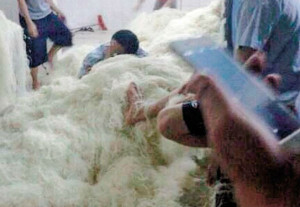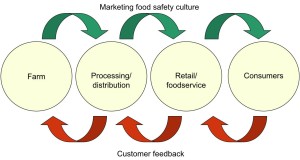Wastewater used to irrigate agricultural crops in countries where water is scarce may contribute to significant public health risks such as diarrheal disease in children from rotavirus. A new study of these risks found that wastewater used to irrigate vegetable plots in Asian countries poses health risks that may exceed World Health Organization (WHO)  guidelines. The authors recommend that stricter wastewater regulation may be needed to protect the health of farmers and consumers worldwide.
guidelines. The authors recommend that stricter wastewater regulation may be needed to protect the health of farmers and consumers worldwide.
The new findings come at a time when climate change and increasing population pressure requires the development of methods to produce more food with fewer irrigation resources. Wastewater reuse is an economical method to grow food, but wastewater carries microorganisms such as viruses, bacteria and protozoa that can contaminate food and cause disease. Asia accounts for the majority of the world’s reuse of wastewater in irrigation, and given that China is the world’s most populous country, millions of people may be exposed to health risks from contamination. However, normal cooking temperatures and food preservation strategies can reduce the risks posed by microorganisms and viruses.
Although health studies can trace the incidence of disease in a population, conducting extensive experimental work and collecting sufficient data can be cost-prohibitive. Food systems researchers Hoi-Fei Mok and Andrew J. Hamilton of The University of Melbourne in Australia instead created a statistical model to characterize the health risks posed by wastewater used to grow Asian vegetables. The reach of the Asian vegetable market extends well beyond Asia. Their paper, “Exposure factors for wastewater-irrigated Asian vegetables and a probabilistic rotavirus disease burden model for their consumption,” recently appeared in the electronic version of the journal Risk Analysis, published by the Society for Risk Analysis.
The researchers first determined the volume of water retained by three commonly grown Asian vegetables, and then used a statistical model to estimate rotavirus disease burdens associated with wastewater irrigation. Rotavirus is associated with diarrheal disease in children, and was chosen as the focus of the study because diarrheal disease is associated with 74 percent of wastewater-related deaths, 90 percent of which occur in children. According to the WHO, diarrheal disease is the second leading global cause of death in children under five years old, and is responsible for the deaths of approximately  760,000 children each year. Diarrhea can last several days, and can leave the body without the water and salts that are necessary for survival. Most people who die from diarrhea actually die from severe dehydration and fluid loss.
760,000 children each year. Diarrhea can last several days, and can leave the body without the water and salts that are necessary for survival. Most people who die from diarrhea actually die from severe dehydration and fluid loss.
Based on their findings, the researchers concluded that the probability curves of the annual disease burden “exceeded the WHO’s threshold for acceptable level of risk from wastewater reuse by two to three orders of magnitude.” Some vegetables posed greater risk than others, because leaf shape affects the amount of wastewater and contaminants that are retained. Vegetables such as bok choy posed the least risk and choy sum the greatest risk, whereas lettuce and gai lan had similar risk profiles. The viral decay rate also varies depending on the plant. The authors say that more research on the rate of viral decay on various crops would increase the accuracy of risk estimations.
The probability of rotavirus infection is affected by uncertainty in virus concentration and variation in vegetable consumption. For example, the mean daily per capita lettuce consumption in Australia is 21.81 grams lettuce/person day, compared to a mean of 171.94 grams lettuce / person day in China, although there is seasonal variation in consumption patterns.
The dose-response model, which characterizes the relationship between exposure level to contaminants and the probability of developing disease, is a source of uncertainty in the risk assessment. The rotavirus infection rates were based on data from an infectivity trial in adults, but rotavirus primarily affects children. Lower doses induce infectivity in children faster than adults, so the estimated disease burdens from the researchers’ statistical model may underestimate the actual risk to children. Collecting rotavirus infectivity data for children would improve the accuracy of risk assessments of the threat.
Although there are Chinese national standards and regulations for the reuse of wastewater, they present only threshold concentrations for bacteria such as E. coli, not viruses. Furthermore, while there are regulations relating to water quality, there is no guideline for risk management around wastewater reuse in China. The risk management approach involves more pro-active identification and management of risk, rather than relying on post-treatment testing for managing reuse schemes. Considering the global increase in wastewater use for agricultural irrigation, assessing the health risks from reuse schemes is necessary to develop better wastewater management policies to protect public health.
 Major Chinese dailies reported that a netizen posted pictures on the Internet, showing the barefoot workers kicking around piles of the noodle on the floor.
Major Chinese dailies reported that a netizen posted pictures on the Internet, showing the barefoot workers kicking around piles of the noodle on the floor.







